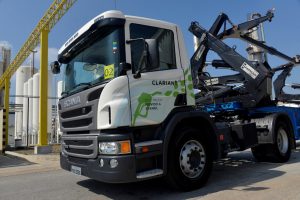Last year, Clariant and Scania partnered to test ethanol fueled heavy-duty trucks. Clariant acquired three Scania P270 model 4×2 trucks, or Ecotrucks, that run on ethanol, and are the first of its kind to be sold by Scania in Latin America. The Ecotrucks transport ISO tanks with a 25,000-liter (6,604 gallon) capacity for chemical products from Clariant’s facility located in Suzano in the state of São Paulo, to a fleet of highway trucks, which then deliver the products to Clariant’s customers. With a year of operating on the books, Clariant is reporting a reduction of CO2 emissions by nearly 90 percent as compared to the diesel engines that were previously used.
 “Clariant is making history in Latin America with this innovative project that demonstrates the value of using ethanol trucks for daily operations. Clariant’s example is drawing interest from other companies that have already contacted Scania about this solution,” said Celso Mendonça, Business Development Manager for Scania Brazil. “Scania values sustainability, so it believes in having an energy matrix that is mixed, uses different sources and allows for fuel savings and a reduction in CO2 emissions. Ethanol-fueled trucks are a solution for companies committed to reducing the environmental impacts of their transportation operations. It is a 100% viable option.”
“Clariant is making history in Latin America with this innovative project that demonstrates the value of using ethanol trucks for daily operations. Clariant’s example is drawing interest from other companies that have already contacted Scania about this solution,” said Celso Mendonça, Business Development Manager for Scania Brazil. “Scania values sustainability, so it believes in having an energy matrix that is mixed, uses different sources and allows for fuel savings and a reduction in CO2 emissions. Ethanol-fueled trucks are a solution for companies committed to reducing the environmental impacts of their transportation operations. It is a 100% viable option.”
The ethanol fuel used by the Scania trucks contains the Master Batch ED 95 additive produced by Clariant Brasil who says the additive allows engines designed to run on diesel to run on hydrous ethanol. It adjusts the characteristics of the fuel to the engines’ requirements in order to make the vehicle run well.
As the second phase of this project, Clariant started using second-generation ethanol as part of the fuel to operate the Ecotrucks. This ethanol is manufactured from sugar cane bagasse using sunliquid technology. Since July 2012, the company has been operating a pre-commercial plant in Straubing, Germany, producing up to 1,000 tons of cellulosic ethanol from approximately 4,500 tons of raw material. At that unit, over 40 containers of sugar cane bagasse from Brazil were processed to manufacture some of the fuel that is being used in the Ecotrucks at the Suzano plant.
“Today in Brazil, we are demonstrating the commercial use of the cellulosic ethanol fuel, using one of the least CO2-producing vehicles available: the Scania trucks,” said Martin Mitchell, business development manager for the Americas. “We conducted several tests to validate the technical and economic viability of the sunliquid technology, which is already commercially available in Brazil. We verified, once again, that producing the enzymes at the plant itself, in a manner integrated with the overall process and specific to sugar cane bagasse, represents the best competitive cost.”

